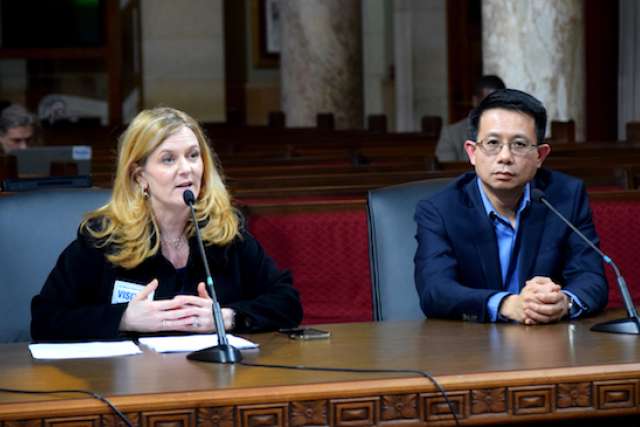Two professors from the UCLA Fielding School of Public Health shared their expertise on the novel coronavirus (COVID-19) with the Los Angeles City Health Commission on March 9, opening an important dialogue between leading health officials and city leaders.
Anne Rimoin, professor of epidemiology, and Gilbert Gee, professor of community health sciences, addressed the commission, which advises and makes recommendations to the Los Angeles City Council.
Rimoin outlined the recent history of similar outbreaks, the origin of COVID-19 and what scientists and health experts know about how this new virus manifests and spreads. There is still a long way to go toward understanding COVID-19 completely, she added, but partnering and sharing with entities like the city and county of Los Angeles will go a long way.
"It's really important for everyone to understand we really are in the learning phase," Rimoin said. She emphasized that "accurate case counts are needed to inform good government decision-making."
"The Los Angeles County Department of Health will be managing this," she said, "but they are going to be managing information from many, many places, and it will be important that cities are being very helpful to the county in order to keep these numbers straight."
City officials can help by trying to have an accurate count of both large and small health care systems operating in the city, and to be especially attentive to the messages it sends its citizens, she said.
"The key issue is going to be how you have good containment of the virus without disenfranchising Angelenos, and I think that's going to be very involving," Rimoin said, noting there will be special populations, including the homeless community, that require special protocols and considerations.
"Early preventable actions will be critical," she added.
Rimoin compared how the cities of Philadelphia, Pennsylvania, and St. Louis, Missouri, reacted to the 1918 flu pandemic. One continued to hold large public events, and the other didn't — statistics show the proactive city, St. Louis, saw a much more controlled outbreak.
Gee agreed on the importance of city messaging, noting that courageous leadership will also be vital, as spikes in racism and xenophobia have emerged in regards to COVID-19.
"This is something that touches many, many communities — not just simply that of the Chinese and Asian communities," Gee said. Research shows "that experiencing discrimination can actually make you sick or sicker than you already are."
Beyond that, he noted, if populations feel discriminated against, they will be less likely to report symptoms and test for the virus, leading to insufficient data on the COVID-19 spread.
"This is something we should all be concerned about," Gee said. "And all our efforts to combat discrimination and encourage people to be more empathetic and friendly to each other and avoid discrimination, and call that out, are important not only as a civil rights issue but as a public health issue as well."
Commission president Dr. Howard Mandel praised the UCLA professors for their presentations. "Right in our backyard we have the ability to tap into you as well as your colleagues, so we can be up to date with the best information science has to offer."



